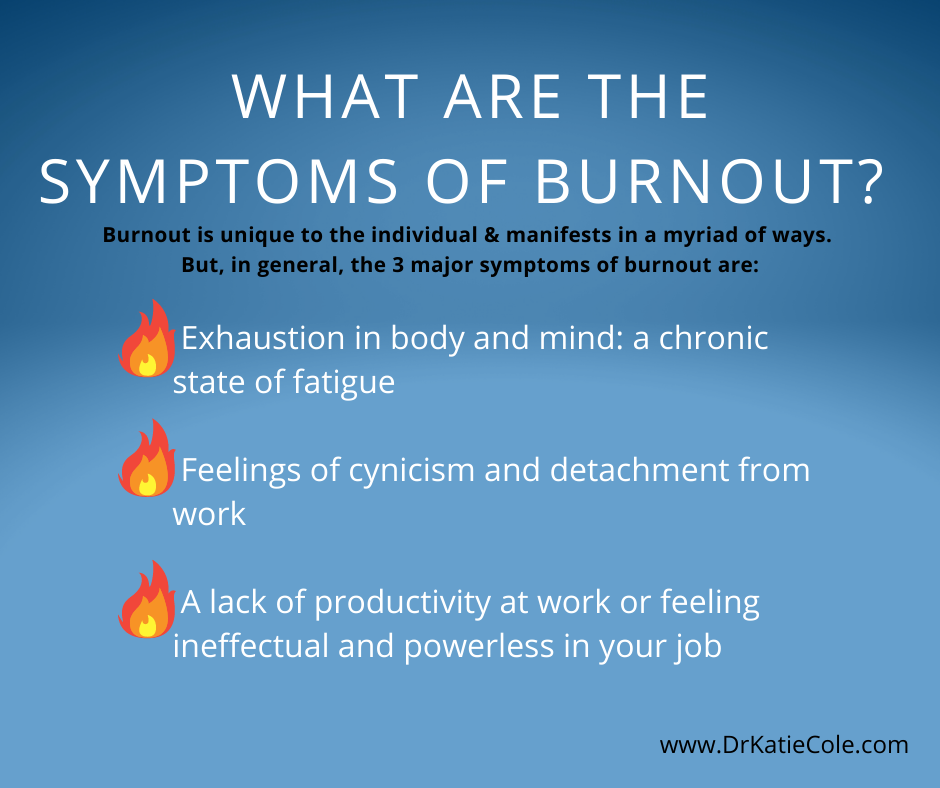Burnout has become all too common in Western society and even globally. Factors like increasing workloads, unrealistic employer expectations, lack of support from colleagues, job insecurity, and unhealthy work/life boundaries are just some of the reasons that people are burned out.
What is burnout?
 First, burnout is real. If anyone tells you otherwise, they are ill-informed.
First, burnout is real. If anyone tells you otherwise, they are ill-informed.
Second, burnout is due to chronic workplace stress. In healthcare, 80% of burnout is directly related to the hospital/organization. Less than 20% of burnout is due to individual factors.
Thirdly, burnout is NOT a mental health condition.
Psychology Today offers a succinct description of burnout:
Burnout is a state of emotional, mental, and often physical exhaustion brought on by prolonged or repeated stress. Though it’s most often caused by problems at work, it can also appear in other areas of life, such as parenting, caretaking, or romantic relationships.
Burnout is complicated because it involves multiple areas imperative to well-being: your emotions, your physical body, and your thinking/mental health. When you’re burned out, one good night’s sleep won’t cure it. People experiencing burnout have been under such extreme stress and pressure for so long that hope, energy, and motivation evaporate.
Burnout is particularly prevalent in healthcare workers, teachers, and caregivers.
What are the symptoms of burnout?
Burnout is unique to the individual and manifests in a myriad of ways. But, in general, the three major symptoms of burnout are:
- Exhaustion in body and mind: a chronic state of fatigue
- Feelings of cynicism and detachment from work
- A lack of productivity at work or feeling ineffectual and powerless in your job
Other symptoms that often occur:
- Insomnia
- Forgetfulness
- Lack of motivation
- Headaches or chest pain
- Increased bouts of illness
- Loss of appetite and stomach problems
- Increased irritability
- Loss of interest in being social with others
- Loss of interest in activities
- Muscle tension
- Difficulty in making decisions and concentrating
- Increased reliance on coping mechanisms such as alcohol, drugs, overeating, or overspending
Is there a difference between burnout and stress?
Yes. Burnout is a protracted period of excessive stress that feels never-ending. Everyday stressors are short-lived with an end in sight. If you experience stress that feels ceaseless, accompanied by feelings of lethargy, despair, and emptiness, you are likely experiencing burnout.
Can burnout make you feel sick?
Absolutely. In addition to the symptoms mentioned above, burnout can weaken your immune system making you more susceptible to illnesses. It can also aggravate and intensify existing health conditions.
Unfortunately, burnout can also affect your mental health. Many people who experience burnout also experience anxiety and depression.
Is it possible to recover from burnout?

Absolutely! In fact, I suffered from burnout myself, and I have fully recovered. Even though it feels hopeless at the time, I am here to tell you that it is not, and you can return to health and happiness after suffering from burnout. It takes a commitment to gain clarity on your situation at work, to see if there are some systemic solutions that will improve your work environment, and also realistically evaluate all areas in your life to see if there are also other factors contributing to your burnout outside of work. That was the case for me, and I made some changes both in my personal and professional life to help me not only heal from burnout but also discover my own needs to create a more fulfilling life.
Tips to Help You Recover from the Personal Impact of Burnout
- Seek professional support – Talk to your doctor, seek out a coach or a therapist, and be open and honest about your symptoms.
- Seek support from family and friends – Talk to a trusted family member or friend about your struggles. Experiencing their compassion may make granting yourself more space to heal easier. And friends are also a great way to have more fun! Laughter with friends can be an incredible stress reliever.
- Practice self-compassion – Perfectionism and burnout often go hand in hand. Give yourself a break. You are a wonderful, imperfect human. Be patient with yourself and the time it takes to recover. Your burnout didn’t develop overnight, and you won’t feel better overnight, either.
- Take time off – This is not an option for everyone, but if it’s an option for you, take it. Give your entire system time to slow down and reset. This pause also may give you additional clarity on positive changes that you can make in your life.
- Set boundaries at work and stick to them.
- Listen to your body – Our bodies are constantly sending us signals. Unfortunately, many of us have become adept at ignoring hunger signals, fatigue, etc. Become reacquainted with your body’s needs.
- Move your body – Find movement that your body loves and do it. Running, walking, swimming, dancing, gardening, skating, cycling, hula-hooping, playing with your dog, etc. There are so many ways to get your body moving!
- Limit your screen time away from work – Doomscrolling is terrible for everyone but particularly bad for those experiencing burnout.
- Find a mindful practice – Meditation, gratitude lists, walking in nature, single-tasking, body scanning, yoga, music therapy… The list of ways to slow down and reconnect with yourself goes on and on. As suggested above, with movement, find a mindfulness practice that suits you. Don’t like yoga but love creating art? Great! Make art and creativity a mindful and healing practice.
With support, patience, self-compassion, and a plan, you can recover from burnout and return to a healthy and productive work-life balance. Visit this site and listen to my podcast for burnout resources. I believe in you!
